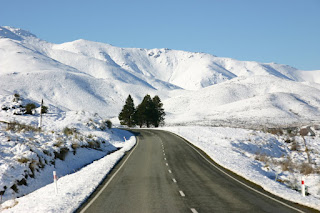The Two Trees, A poem by W B Yeats, set to music and sung by Loreena McKennitt
I was talking with a colleague the other day, about our shared task, when, in a kind of inconsequential aside, she showed me the picture of a tree. She told me it was her favourite tree, in all of Dunedin, and where it grew and why she liked it. Then she asked what my favourite trees were, and I was flummoxed. I love trees and think of myself as a sort of a greenie, but to my own astonishment I could not name one single tree in all our leafy city which stood out for me. So we finished our business quite satisfactorily, she forgetting, probably, that this had ever been part of our conversation, and me to drive away from her office thinking about her question for the rest of the day. And I have been looking at trees ever since and wondering about ones that I like and why.Two trees grew in the Garden of Eden and will grow in the new Eden to which we will one day return. I pray daily on a rug, bought in Jordan, into which is woven the image of the tree of life. We speak of our ancestral trees and the various trees of knowledge. None of us would be alive if it weren't for all the trees industriously performing the chemistry which stores and disposes of CO2 and produces O2 all day and night. But there's no one tree in our city that acts as a totem to me, and which I pass and note and take pleasure from daily.
But there are some trees which I have photographed over the years, and of which I keep the images because they speak to me.
This is a photo taken on the first journey I made after my operation for cancer in 2008. I was driving in a snowstorm between Middlemarch and Outram, and saw this tree and the one that follows, both as metaphors for the place in which I found myself at the time. I have many times since looked for this tree, but never found it. Perhaps it is now gone. Perhaps it has grown and changed unrecognisably.
This is a tree growing on the headland at Doctor's Point, perhaps my favourite of all Dunedin's many lovely beaches. It looks so lonely and strong and resilient. I have photographed this tree many, many times.
These trees growing in The Pigroot are accidental remainders of some previous attempt at living in this fierce landscape. They have survived long after the building they were planted to shelter.
A soldier tree. Throughout Northern Otago oak trees were planted in 1919, one near the residence of every man from the district who died in World War 1. Almost all still remain, spread over most of the province, the largest war memorial in the world by area.
A tree growing on the shore of Lake Wanaka
And gathering these, I see their commonality. And am taught by them. And rejoice in them.






Comments